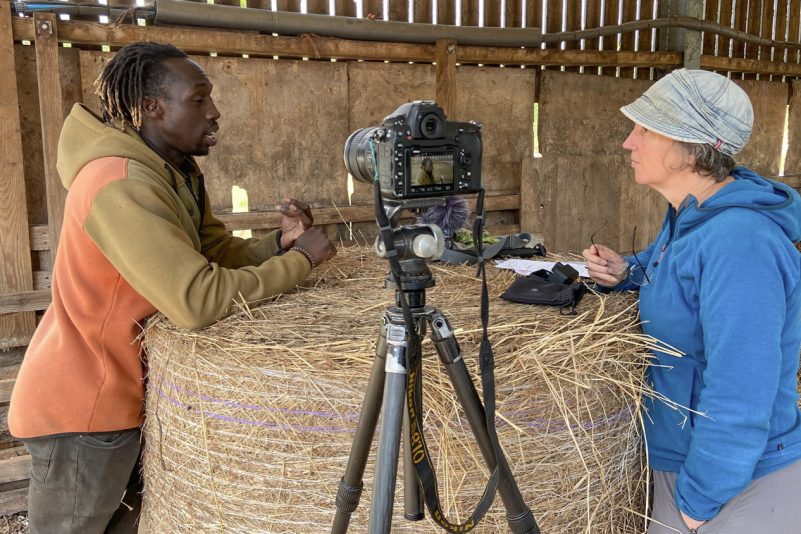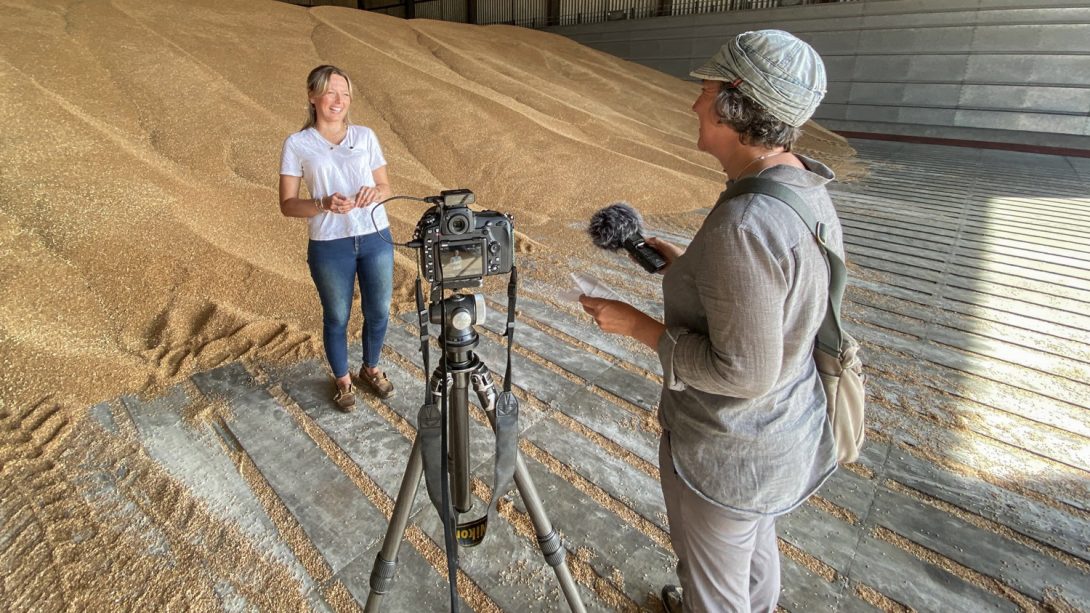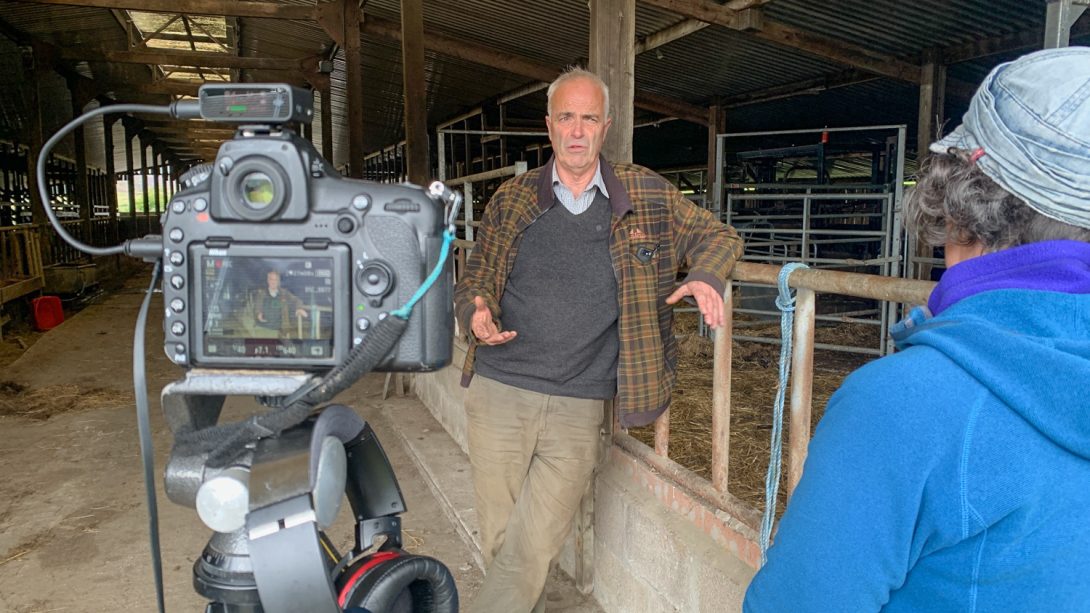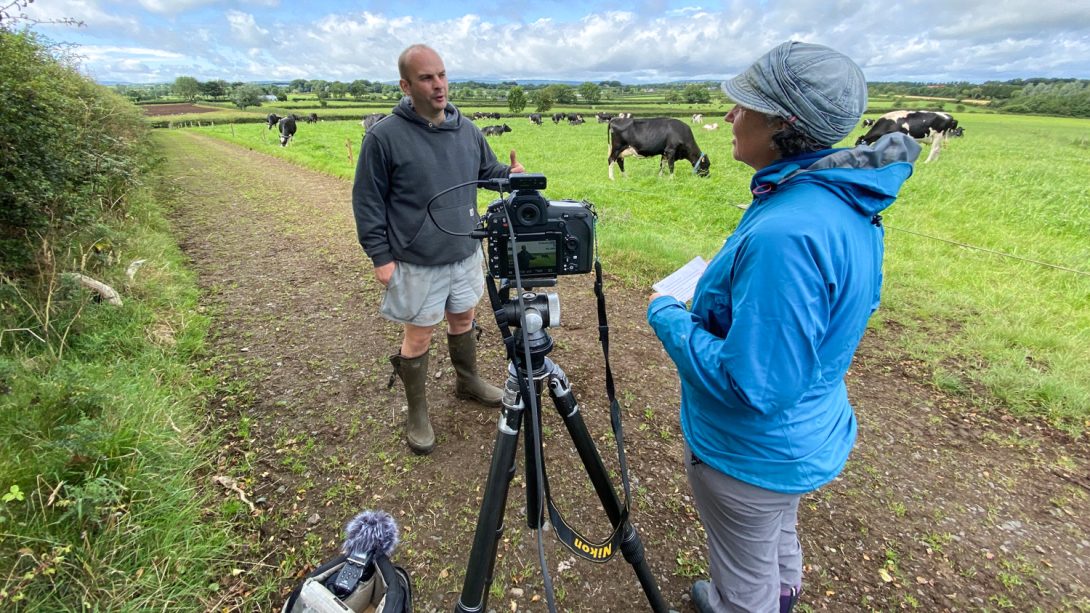Land Use and Net Zero: Land Manager's Perspectives

What might farmers and other land users and land managers do in the quest to reduce greenhouse gas emissions and increase their sequestration of carbon? This is a pressing question. It’s nested within many actions spanning policy, practice, supply chains and consumer choices that will be required for the UK’s land use sector – and there certainly isn’t a one-size-fits-all answer.
“There's the stereotype that farmers are old boys with their trousers tied up with baler twine, but actually that's not really the agricultural industry we're seeing anymore. I think for young people it's starting to look a really exciting place, and something that you want to get involved with.”Martha Hayes, farmer, Lincolnshire
To kickstart discussions at the recent LUNZ Hub ‘Big Tent’ event in Edinburgh, where almost 100 people from practice, research and policy met to discuss the issue, Rob Fraser , one of the artist leads from the PLACE Collective, brought together the perspectives of seven people in two short films.
The presentation of seven voices responding to interviews carried out by Harriet Fraser (also from the PLACE Collective) demonstrates the diversity of land use and land types across the UK, as well as policy and governance differences in the four nations.

The film-making journey around the UK took Rob and Harriet to the flat lands of Lincolnshire, where they met arable and beef farmer Martha Hayes ,and to windswept peatlands and intimate valleys of Wales, to meet hill farmer Lisa Roberts. They spent time among rolling green fields of Northern Ireland, talking to dairy farmer Hugh Harbison, and visited the small, mixed farm of Flavian Obiero in southern England. In Scotland, the Frasers visited Andrew Barbour on his organic hill farm, which embraces woodlands, moorland and mixed-use land, they wandered through old and new woodlands with Balbeg Estate owner Andrew Sinclair, and chatted among cucumbers and tomatoes in the polytunnel of a city farm with Land Workers Alliance Scotland policy and campaigns coordinator Tara Wight. They heard different stories about change, opportunities and challenges: and many commonalities too, including experiences of dealing with unpredictable, volatile weather and uncertainty around policies and markets.
“This is maybe not what you want to hear, but it's not really financially worthwhile for us to go down the road of trying to get to net zero.... nobody's going to pay us to be net zero. People pay us to produce really good quality milk.”Hugh Harbison, Aghadowey, Northern Ireland
The people featured in the films called for more joined-up thinking among decision-makers, greater recognition of effective low-tech solutions, reform in land ownership, more trust in farmers, food sovereignty, greater clarity about ‘net zero’ as well as carbon auditing and soil testing – among other things. They also shared an enthusiasm for increasing their own and their sector’s understanding about modifying practices and other measures that can help in the move towards net zero; and shared their experience of positive steps, including using Lidar scanning and soil testing to better understand a farm’s ability to store carbon, planting hedges and trees, changing grazing patterns and supporting resilient communities.
“One of the things that brings me joy through working with the Landworkers Alliance is getting to see the work that our members are doing. They are literally growing beautiful things, producing delicious food, creating amazing habitats.”Tara Wight, Scotland Policy and Campaigns Coordinator and Research Coordinator, Landworkers Alliance
Each person was asked the same set of questions – with slight adjustment depending on their context. (If you’re curious, these are listed at the end of this article). “It’s a challenge to select short excerpts from seven incredibly rich conversations,’ says Rob. “And of course the conversations during each visit extended beyond the formal interview. I’ve tried to include the wider context by sharing footage from each person’s location. Everyone has been extremely generous with their time – there’s no better way to learn about a patch of land than to walk it with someone who knows it well, cares for it, and has a vision for its future.”

The pressure is on for the Land Use sector to build on existing good practice and scale up transformative changes to contribute to the UK’s target of reaching ‘net zero’ by 2050. But the focus is not exclusively on carbon or net zero. The voices in the films show that carbon sequestration is in an inseparable relationship with nature and people, and actions to reduce greenhouse gas emissions and increase sequestration need to be integrated with actions that improve habitats and connectivity in the landscape, for wildlife to thrive, and also support viable land use businesses, not just for the provision of food, but also as foundations for rural communities.
“When you're trying to get to net zero, you can't do it in little silos. You can't just look at farming, you've got to look at the whole food system. You've got to look at what the land can produce and therefore what should be supported in a sustainable fashion … You should stop trying to produce foods that are damaging to the world that we live in - simple as that. And, just because it can be done, doesn't mean that it should be done.”Andrew Barbour, Pitlochry, Scotland
The two films aim to highlight experiences of change among land users and provoke further discussions about finding ways forwards that are positive for nature, people, and the target of net zero. Their first showing at the Edinburgh event did just this, with lively conversations in breakout sessions, the outcomes of which we’re looking forward to sharing soon. There’s an ambition to create more films to bring in perspectives from other land managers, including specialists in conservation and forestry, as well as scientists and those involved in shaping governance and policy. Watch this space!

Interviewees for the films were contacted with the help of the LUNZ Hub consortium leads from England, Scotland, Wales and Northern Ireland. The questions for the interviewees were developed by Rob Fraser and Harriet Fraser of the PLACE Collective in close collaboration with Professor Martin Philips from the University of Leicester and Evi Arachoviti, from Innovation for Agriculture, who are working together as part of the LUNZ Hub ‘work package’ focusing on transdisciplinary community and capacity building.
Featured on the film, in running order:
Andrew Sinclair, owner, Belbeg Estate, Ayrshire, Scotland
Martha Hayes, arable farmer, Lincolnshire, England
Hugh Harbison, dairy farmer, Aghadowey, Northern Ireland
Tara Wright, Scotland Policy and Campaigns Coordinator and Research Coordinator, Landworkers Alliance
Flavian Obiero, farmer, Hampshire, England
Lisa Roberts, farmer, Dovey Valley, Wales
Andrew Barbour, farmer, Mains of Fincastle, Pitlochry, Scotland
Questions posed to the interviewees:
- What do you understand by the term ‘Net Zero’?
- To follow on from this, what does a drive to reach ‘Net Zero’ mean for your business/practice?
- Have you experienced any direct impact of a changing climate?
- Thinking about your business/practice/area: Are there any practices, either already in place, or new initiatives or adaptations, that are part of Land use for Net Zero and for nature recovery?
- What motivated that change?
- What are the positive impacts of adapting practices – for you, for your business/community?
- What are the main challenges in adapting practice or introducing something new?
- What if anything will help you to make (further) changes or introduce something new in your business/farm/practice/area?
- What role do you feel that government policies have to play in a just transition?
- The full name of the LUNZ Hub is Land Use for Net Zero, Nature and People. If the land and wildlife were part of this conversation, what do you think they might say, or ask of us?
- What do you think will happen to your landscape/farm/community/woodland if the UK doesn’t reach its Net Zero targets by 2050.
- Where and how, in the midst of everything that’s going on, do you find joy?
Subscribe to our Newsletter
A quarterly update of all LUNZ Hub activities, events and news stories.
